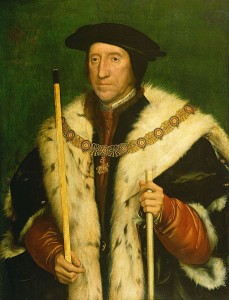 On this day in history, 12th May 1536, a patent was issued appointing Thomas Howard, 3rd Duke of Norfolk, as Lord High Steward of England to preside over the forthcoming trials of his niece and nephew, Queen Anne Boleyn and George Boleyn, Lord Rochford. The trials would take place on 15th May 1536 in the great hall of the royal palace complex at the Tower of London.
On this day in history, 12th May 1536, a patent was issued appointing Thomas Howard, 3rd Duke of Norfolk, as Lord High Steward of England to preside over the forthcoming trials of his niece and nephew, Queen Anne Boleyn and George Boleyn, Lord Rochford. The trials would take place on 15th May 1536 in the great hall of the royal palace complex at the Tower of London.
Norfolk had served in the position of Lord High Steward before, at the trial of Lord Dacre in June 1534, but this was obviously closer to home. These defendants were the children of his sister, Elizabeth Boleyn, Countess of Wiltshire.